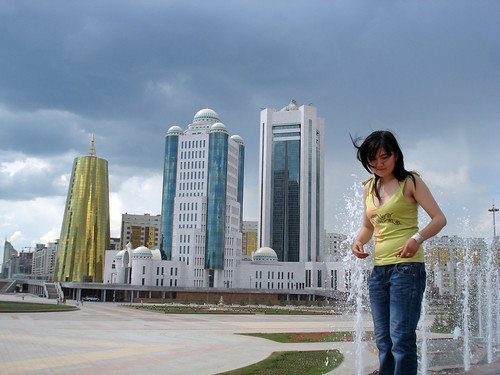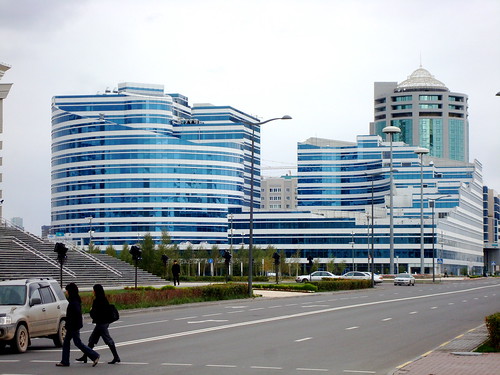As I leave work, I see one of the maintenance men leaving, and catch a ride across town with him. We wait for his nephew, as the country’s flags whip back and forth on the flagpole.
“Once, you Americans were the enemy,” wrinkly-faced Bekbolat nods to me in Russian. “Fight the capitalist oppressor, give them no quarter! It was our duty,” he says, as a blue flag blows behind him in the cold wind.
“And we wanted to go fight in Afghanistan, to do our international duty” in the Soviet Army, he explains. (It reminds me of the documentary, The Last Soviet in Afghanistan.)
Bekbolat pauses. “My friend went and came back, his leg was gone. But I wanted to do it, to go.”
“And after he came back, you still wanted to go?” I ask.
“No, not now,” he shakes his head, “but then.”
Bekbolat’s nephew drives up, and we start across town. I learn that my colleague is in his early forties, the nephew in his late teens. Over ten years ago, they moved here from the old capital, Almaty. Bekbolat tells me that he learned a little English is school, but never needed it—it was the Soviet Union then.
“Then we needed German,” he says. “We saw the wall fall, east and west. During that time there was not rich or poor, and everyone had work. They had holidays, for one month we went to the sanatoria (resort). But now…” he says as his nephew peels the car around a corner, glass skyscrapers flying by.
“People work too much?” I ask.
He shakes his head, “No, they can’t find work, amal jok, they can’t do anything. But they have to work, even though the money is poor. So if the jobs are bad, they stay.”
I’m surprised, though. I thought that everyone comes to Astana for work – it’s certainly why I’m here.

Some time earlier. Vika and I meet over tea one weary weekend day, and she tells me she’s looking for another job. She’s gotten tired of this one, managing a local university department. When we chat about our long hours, she tells me the joke about government workers here, who are renowned for working 9-9 at low pay, even though local labor laws limit our work to 40 hours a week:
A guy comes into work early on a Monday morning and works until six pm, packs up his bags, and heads home. His coworkers make eye contact and shrug – he must have something important to do. Next day, he comes in at nine, works till six, and again leaves. They raise their eyebrows and gossip. Third day, he comes in, works all day, and gets ready to leave at six. His coworkers intervene, “Hey, whaddaya think you’re doing?”
“Rebyata!” he tells them, “Vy shto, eta zhe moi otpusk!”
That is: “Hey guys… what the hell, I’m on vacation!”
It’s taken me a while to adjust to this working culture, as I’m used to the American ideal of flexible hours for working professionals: hustling sixty hours a week, sure, but in flexible ways, at home or in the café.
And it’s also taken me a while to understand the difference between small-town social life and the social networks of a city. I remember hitting the end of my first year and feeling bewildered: I had worked hard, met with friends, gone for drinks… but didn’t feel connected. I had plenty of vague friends, but friendship with one person only ever seemed to translate into… occasional meetings with that one person.

Perhaps it came from growing up in small towns and suburbs, where meeting one person leads to meeting their friends. If you all get along, you start to hang out in groups. If someone’s new, you invite them along with your friends. This has been my experience in Ohio, in Indiana, and in Texas.
But it wasn’t working for me here. I took stock of my workmates: Katya with her husband and handful of classmates; Leila who lived alone and had a platonic relationship with a guy several years younger; Darina with two boyfriends who don’t know each other, and Ayagul who sat at home alone each evening to call her mother (and her secret boyfriend, back in the village). Most of these young women were borrowing family money to buy a small flat, choosing to pay $800 (120,000 tenge) each month in mortgage payments rather than $600 (90,000 tenge) for rent, taken out of their $1000 monthly salary.
“I’d love to visit my daughter,” Darina says, “but there are no jobs back home.” She tells me that she plans to work ten years here, then move back to live with her parents and young daughter in her hometown. Each woman wants to live with family, but her parents don’t want to uproot and move here. And after living in the city, it would be hard to move home: they wouldn’t quite belong; they would miss their independence, their salaries, their career prospects, their manicures and pedicures.
How We Extend Social Groups and Networks
But society isn’t all atomized. For all the closely-clustered social networks of home and work, I also see broader connections. And the presence of these networks is just as interesting to me as their absence of networks in the lives of others. Most often the well-networked person seems to be involved in:
a) religious groups. Actively attending a church or mosque may provide people with a way to meet other new residents, be encouraged, and have casual social contact with co-religionists – sometimes the very people who can help you learn a new language, get a job, or travel abroad (to Arabia, India, Europe, or America).
b) multi-level sales groups like NEWAYS, Tienshi, Mary Kay, or Avon. MLM groups offer regular training, inspirational sales retreats, feel-good mantras, small-scale businesses, and social contact. Many sellers seem to be young women with ambition, but facing a glass ceiling at their official desk, school, or medical job.
c) the Astana Alumni Club (for former study-abroad students), American Corner, Toastmasters, business network, InterNations, FryDay, Couch Surfing meets, Astana International Club (for expats) and other deliberate, official attempts at networking.
All in all, it’s easiest to meet new people in these type of voluntary organizations, where networks are loose and people come and go.
Of course officials sometimes get concerned with people who start connecting into religious groups, or who join companies that sell dubious health remedies ‘from America’. But I also think these groups grow when they meet a need residents can’t fill another way: when Bekbolat is left with nostalgia for the social connections and economic assistance of the Soviet Union, when young migrants like Leila feel isolated and spiritually empty, when ambitious young professionals like Arzhan want to start a business but don’t have the right “connections” to rent a café or kiosk at a bazaar.
And looking back, I realize that when I first moved to Astana, I was welcomed by people in a) churches and b) multi-level marketing groups. These environments felt warm and energetic, with people who offered to help, not jut people asking for more overtime at a workplace. I felt at home with these people, even if sometimes they were a little weird.
A few years ago, I read Tom Wolfe’s massive new novel, I am Charlotte Simmons. Although somewhat overdone, I was struck by his portrayal of the American college experience, and of a young Appalachian woman who gets swallowed up in the partying and sex and sports and political manipulations of big campus life.
The picture of university was accurate, but I also felt that there was something missing. I’d felt Charlotte’s disorientation when starting university– but I found a place not in sports and drugs, but in philosophy groups, the honors house, the volunteer groups who sorted dented boxes at the food pantry, the girls who visited the elderly in awkwardly cheerful and sterile nursing homes. No one forced us to show up, but choosing to do so let me meet other (introverted) people who were also looking to meet a wider circle of friends. (Actch, now that I think about it, introversion could explain a lot of things in this post!)
Developing a New Civil Society
And some of that, I think, is what people talk about when they talk about civil society. It brings to mind a book called Habits of the Heart. It’s a book which I should have read ten years ago, but… when our freshmen group of honors students (!) asked for less work, the professor let us fill up the semester with articles from The Onion (!) instead.
At any rate, author Robert Bellah summarizes his book in this speech. Roughly, he says that Americans in the 19th century experienced the striving of a new nation. This new country, America, told itself the story that it was about individuals leaving the family and going to the big city or the gold mine or the prairie, and striking it rich. Such a modern hero became prosperous, successful, wealthy… and mostly alone.
Yet Bellah – and he cites French thinker Alexis de Tocqueville in this – critiques this type of individualism that looks only to our own friends and family, that of a man “forever thrown back on himself alone” (de Tocqueville). Bellah uses de Tocqueville’s travel writing on early America to ask what makes us citizens, what habits of the heart would cause people to voluntarily connect with each other and peacefully build a democratic society. Both ultimately recommend things like voluntary community associations, religious groups, and strong family ties as ways to counteract this individualism. That resembles much of what I see in how people connect here in Astana.
Now that I’m living in a country that’s building an ambitious new city from scratch (as many American cities were doing 150 years ago), I think this is an interesting question to be asking. The religious and marketing and expat social clubs are great for providing connections for some, but what about everyone else? What other types of low-cost and voluntary associations are possible: Writer’s groups? Reader’s clubs? Makerspaces (yes please!)? Community gardens? Informal football clubs in open fields?
I’d love to know where this is already going on in Astana, and how much it has the potential to cross social lines. Can you connect a fruit-stand seller with a young professional who studied abroad, with an expat businessman, women at the market, men who drive taxis, and wealthy property owners?

I’m hoping this is possible, and soon to happen. I imagine that as people connect online and in-person, informal initiatives and volunteer ways of helping will continue to grow in an otherwise very work-focused city. I’d love to meet more than just the expats, and I’d love to see social networks in Astana expand and deepen for everyone, as I’m sure they will do in time.
Post-notes:
1) Can you see my American cultural values? I can see it in Bellah’s article, although he’s glad to have Canadian and Japanese scholars checking his facts. This makes me wonder what I’m missing, though, and I’d love to see what you see.
2) My colleague Alima Bissenova is quoted in a new article (in German?) that references the high population of ambitious young workers in the city, and the need for more development of the city’s ‘soul’: http://deutsche-allgemeine-zeitung.de/de/content/view/2786/1/
